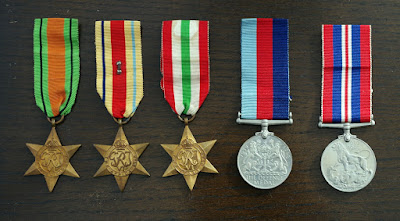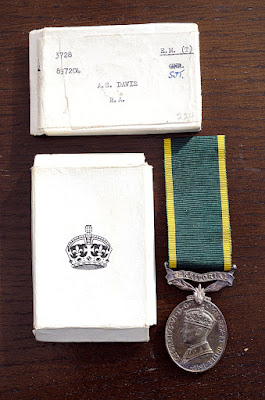Dad's service in the Boys' Brigade
Reaching the rank of sergeant in the Boys Brigade;
I have an old wrist watch box which mum had written on the lid:-
"Sergeant A.S.Davis
9 badges.
His collection of badges got in his 6 years in the Boys Brigade."
...but there are only 4 inside:-
Clearly one is for swimming, but I haven't identified the others so far.
Dad’s Service Number
His ID (or ‘dog collar’) bears his name, his religion (Church of England), and service number 897204.
When you were called-up/signed-up for military service, they always asked for your religion. If you said “none” they always stamped your ID with “C of E”.
The reason there were 2 ID tags on the same chain is that if someone was killed on the battle field, the red tag was cut off and used to record the death, while the green one was left with the body for burial details (e.g. grave marker).
I understand these tags are made from vulcanised asbestos, but have been unable to establish whether they represent any kind of health risk or whether the asbestos is inert. Asbestos is a generic name for various types of fiborous minerals which have a sharp, needle-like structure. These fibres can became embedded in the lungs if inhaled and the body is unable to deal with them, often with fatal consequences.
Rising through the ranks
Judging by the information on the Army website ( http://www.army.mod.uk/structure/32321.aspx ) it can take a regular soldier many years to achieve promotion to the level of Sergeant during peacetime. But things clearly move quicker during wartime.
From a Gunner in 1939, through Lance Bombardier and
Bombardier, to Sergeant in August 1942.
He was granted war substantive rank of Sergeant (w/Sgt) on the 19th January 1943.
He was granted war substantive rank of Sergeant (w/Sgt) on the 19th January 1943.
As far as I know, progression through the ranks from basic "Gunner" normally followed this sequence in wartime:-
- Lance Bombardier; 1 stripe
- Bombardier; 2 stripes
- Lance Sergeant; 3 stripes (see Lance Sergeant Mason below)
- Sergeant; 3 stripes with the Gun emblem above (see dad's photo above)
- Staff Sergeant; 3 stripes with the Crown emblem above (see Staff Sergeant Innes below)
 |
| Lance Sergeant "Mago" Mason |
 |
| Staff Sergeant Innes (59th R.E.M.E.) |
20-1-41 Appointed U/L/Bdr
4-2-41 Amended to U/A/L/Bdr wef [with effect from] 10-1-41
11-5-41 Appointed P/L/Bdr
27-6-41 Promoted A/Bdr (unpaid)
4-10-41 Having held A/Rank of Bdr for 3 months is granted W.SR
18-2-42 Appointed U/A/L/Sgt
4-8-42 Appointed U/A/Sgt
19-1-43 Granted W/Sub rank of Sgt
I think the abbreviations mean:-
A/ = acting
P/ = permanent
U/ = unpaid
W/ = W/SUB = W.S.R. = War Substantive Rank (e.g. rank can't be taken away [in wartime] except by Court Martial)
End of service report
Dad's release papers include a simple report (rather like a school report).
Military Conduct: Exemplary
Testimonial: A very capable mechanic (gun & vehicle) who has given his service most willingly. A very keen & intelligent man & good sportsman. Completely honest, sober & trustworthy.
I can only assume "sober" had a different meaning back then!
Dad’s Medals
From left to right (in order of wearing);
-
1939-1945 Star for at least 180 days service overseas
-
Africa Star for service in Africa. The “1” on the
ribbon denotes the 1st Army
-
Italy Star for operational service in Italy
-
Defence Medal often awarded with a Campaign Star
- War Medal for at least 28 days war service
Note that the ribbons for the 1st
and 4th medals have been accidentally switched (i.e. sewn
onto the wrong medals).
The Efficiency Medal (Territorial) was apparently awarded to my dad for military service of at least 12 years. Since each year of the war (1939-1945) counted as 2 years, his service period from 1938 to 1946 was long enough for him to qualify.
It is his only medal to include lettering along the edge:-
897204 SUT A.S.Davis R.A.
I think SUT = soldier under training, but this doesn't make any sense to me.
Certificate of Appreciation
 |
| Job done! |
<<BACK HOME NEXT>>








